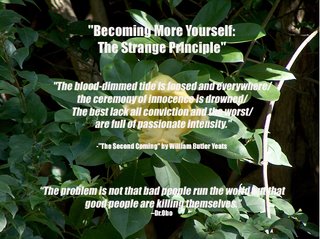 When we listen to ourselves, when we listen to our own lives, when we fundamentally respect our own lives, we see that we naturally expand with wisdom and right action into our environments.
When we listen to ourselves, when we listen to our own lives, when we fundamentally respect our own lives, we see that we naturally expand with wisdom and right action into our environments.When we follow the trends, traditions, mores, and rules of others and do what we think others want us to do just for the sake of conformity, we fundamentally disrespect our own lives. Even a thought or action that seems to be noble and selfless can be a bad cause when performed by someone who isn't honoring their own life.
This problem with incorrect practice happens to well-intentioned people who practice this Buddhism all over the world. The following passage was written from a struggling member to Dr. Obo, a member of the doctor’s division who wrote the guidance I will be working from today:
"As you have written I have done my best to do shakabuku up until last year, to promote the World Tribune, gave lots of zaimu, and fought with all my strength. But this year I am fighting illness and I'm on welfare. Why, despite my hard work, are all of these things happening to me?"
Dr. Obo responds that when you say “if I do these things, then I can become happy,” this is a life condition of hunger. You are also expecting something in return, so if you don't overcome your problem you end up resenting the effort you put forth. It is different from the life condition of Bodhisattva.
My happiness is the immediate result of appreciating my existence as is it, because it is. This doesn't mean I stop doing, stop reaching out, stop having goals for myself and others—this means that I do these things as an extension of my own sense of power, wonder, and the pull of earthly desires and my need to fulfill them—not as a system of rewards and punishments. This is not a game—it's not someone out there keeping score. As Dr. Obo writes:
"You accumulate fortune when you rejoice and enjoy whatever you do and when you allow your life to shine as it is. It will become your good fortune. Automatically, others will value your existence."
Question: Do you agree that there might be a connection between being ‘good’ and not valuing one’s own life? How do we often define ‘good’? In what ways can being ‘good’ actually lead to lower life condition?
Dr. Obo writes:
"It's okay that we seem like we are arrogant, or audacious or bold although people might not like it. Yet, if we change our attitude this way, everything strangely starts to open up. I often realize that when I see such cases and people. Conformists are now deadlocked.”
“In observation of many people, conformists, hard working, responsible, caring and altruistic people, mysteriously enough come to a deadlock. Those conforming to other while working hard cannot break through. These altruistic people often face rejection, refusal, being made fun of, and in extreme cases are despised. Serious conformists can’t advance.
“On the contrary, irresponsible, arrogant, and shrewd people are successful in every attempt. Since everything goes well and they are targeted for flattery they become even more successful. This is a very popular phenomenon. While I have encountered various types of people and their lives, I have witnessed many of these cases. What is this all about? Earnest people are fooled and the villains get fattened up.”
He expresses this phenomenon as the “Strange Principle.” "Strange” means Myo and “Principle” is Ho. Thus, people who neglect the entity of the Mystic Law lose fortune. People who shine their entity of the Mystic Law multiply fortune. The question is what way you are. Simply, it is either way. It is whether you shine in your life, and the direction in which you enjoy living, or a direction in which you disrespect yourself. Dr. Obo writes:
"Gohonzon means the object of fundamental respect. President Ikeda's guidance said, "What do we fundamentally respect? It is one's life. Our life has the highest value. It is the foundation of respect. The respect of one's life, therefore, can not be based on whether one succeeds or fails. No matter what happens, we must start from respect. This is the meaning of embracing the Gohonzon."
“If serious people, kindhearted people, good people, and warmhearted people speak up and stand up for justice and create momentum, selfish people will automatically feel uncomfortable and eventually vanish. President Makiguchi once said, only if we create this can we have the “era of humanistic competition.”
Question: Can irresponsible, arrogant, and shrewd people really gain fortune the way Dr. Obo says they do? If so, why? And how can good people empower and respect themselves without becoming irresponsible, arrogant, and shrewd?
Very pretty site! Keep working. thnx!
ReplyDelete»